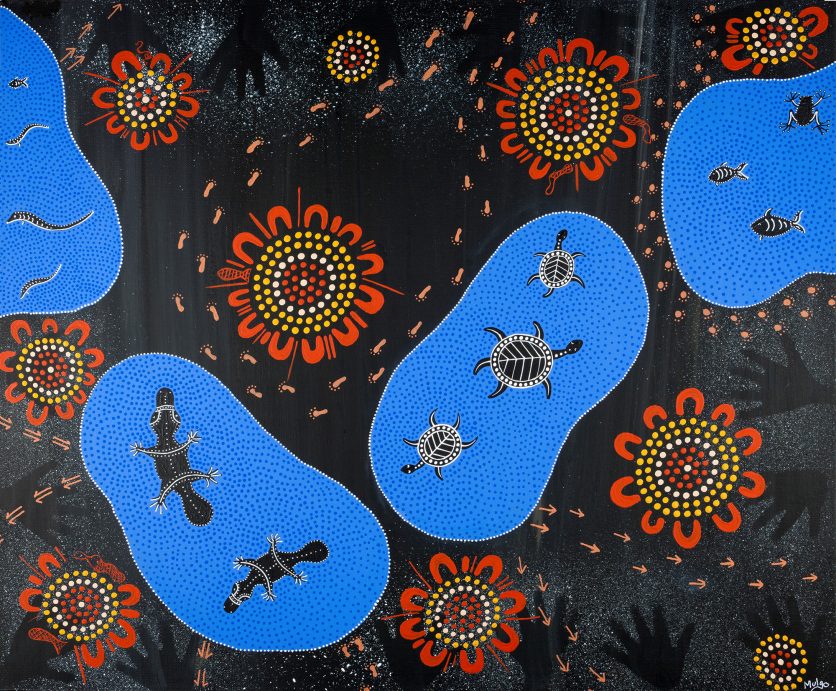
Digital stories with Leanne ‘Mulgo’ Watson Redpath and Rhiannon Wright
From AugustTake a seat for our new series titled Digital Stories, our first edition with Leanne 'Mulgo Watson Redpath and Rhiannon Wright.
Bayadyinyang budyari Dharug yiyura Dharug Ngurra.
Bayady’u budyari Dharug Warunggadgu baranyiin barribugu.
Bayady’u budyari wagulgu yiyuragu Ngurra bimalgu Blacktown City. Flannel flowers dyurali bulbuwul.
Yanmannyang mudayi Dharug Ngurrawa. Walama ngyini budbud dali Dharug Ngurra Dharug yiyura baranyiin barribugu.
We acknowledge the Traditional Custodians of this Land, the Dharug people, and their continued connection to Country.
We pay our respects to Elders from yesterday to tomorrow.
We extend that respect to all Aboriginal and Torres Strait Islander Peoples of Blacktown City where the flannel flowers still grow proud and strong.
We will walk softly on this land and open our hearts to Country as the Dharug people have for tens of thousands of years.
Credit to: Dharug woman Rhiannon Wright, daughter of Leanne ‘Mulgo’ Watson Redpath and granddaughter of Aunty Edna Watson


Reimagine your relationship with screen and discover the playful and provocative films of Shortwave.
Shortwave is a screen program by Sydney Opera House that commissions interdisciplinary artists to explore their relationship with the screen.
The 2024 iteration invites multi-disciplinary artists Maissa Alameddine and Narjis Mirza to build upon their recent collaboration, Rahma: Our Creative Feminine. Previously presented at The Leo Kelly Blacktown Arts Centre, the artists continue their exploration into the sacred practice of the lullaby through Shortwave.
Mohabbat, a Lullaby for a Rising is a short film beginning in the womb and connecting to the creative and protective qualities of the lullaby. The film then moves out into nature, where the lullaby transforms into a cry for healing relationships and country.
This new short film explores the sacred practice of the lullaby, and how its creative power guides us to imagine true liberation.
Filmed on Dharug, Bidjigal and Gadigal lands and waterways.
Missed out on the screening? Stream online now!
Lead Artists
Maissa Alameddine and Narjis Mirza
Featuring
Katie Shammas, Maissa Alameddine, Narjis Mirza, Rawi, Tamara Alameddine Needham and Vasy
Vocals
Mago Shaheen, Maissa Alameddine, Mumtaz Mirza, Narjis Mirza, Nour and Vasy
Cinematographer & Editor
Matthew McGuigan
Camera Assistant
Eleanor Witt
Audio Recordings
Kurt Mikolajczyk, Maissa Alameddine, Narjis Mirza and Safe House Studios
Audio Post Production
Matthew McGuigan

Narjis Mirza is a media installation artist who orchestrates a poetic, philosophical, and spiritual exploration of light through sensory installations. Her work encompasses large-scale light and sound installations, seamlessly integrating projection, animation, video, textile, and voice. Through immersive experiences, she invites viewers to actively participate, transforming her artworks into interactive events.
Initially trained as a painter, Narjis graduated with the highest honour from the National College of Arts in Pakistan and went on to pursue a Master’s in Media and Design from Bilkent University, Ankara.. In 2017, she was awarded the Vice Chancellor’s
Doctoral Scholarship, culminating in a practice-led PhD at Auckland University of Technology, New Zealand. Her journey led her to exhibit her work in New Zealand, Turkey, and Pakistan. Narjis contributed to the development of interactive participatory media art at the Interactive Media Lab, University of New South Wales.
Her research has produced a body of work, notably the multisensory installation Hayakal al Noor, Bodies of Light, inspired by Islamic philosophy, and her latest work, Rahma: Our Creative Feminine.

Maissa Alameddine grew up in Tripoli Lebanon and now lives and works on the unceded lands of the Cammeraygal and Dharug peoples. Maissa is a multidisciplinary artist, vocalist, performer, and creative producer working across a range of mediums.
Maissa’s work explores the idea of migration as a chronic injury. Maissa inherited her voice from a long line of women vocalists, she uses voice as a provocation and a response. Her work is personal, exploring inheritance and transference of heritage in the complexity of what is coined by Lebanese Australian anthropologist, Ghassan Hage as the ‘lenticular diasporic existence’. Her interpretive song and music is an attempt to honour her ancestors.
Maissa has been part of the contemporary Arab Australian arts community for over twenty years, performing with Arabic music ensembles, Western orchestras, and art organisations. She is a founding member and one of the creative producers of Western Sydney-based Arab Theatre Studio.
This project was commissioned by Sydney Opera House as part of Shortwave, produced by Blacktown Arts and supported by Blacktown City Council and the NSW Government through Create NSW. Mohabbat, a Lullaby for a Rising was developed by Maissa Alameddine and Narjis Mizra and filmed by Matthew McGuigan.

